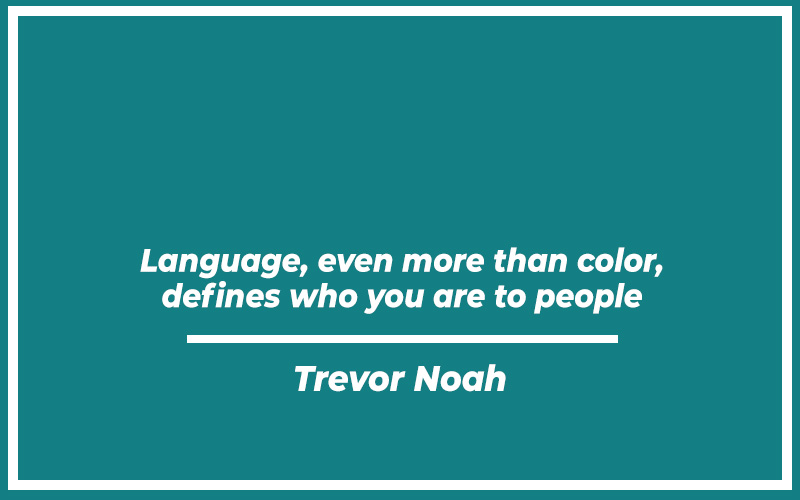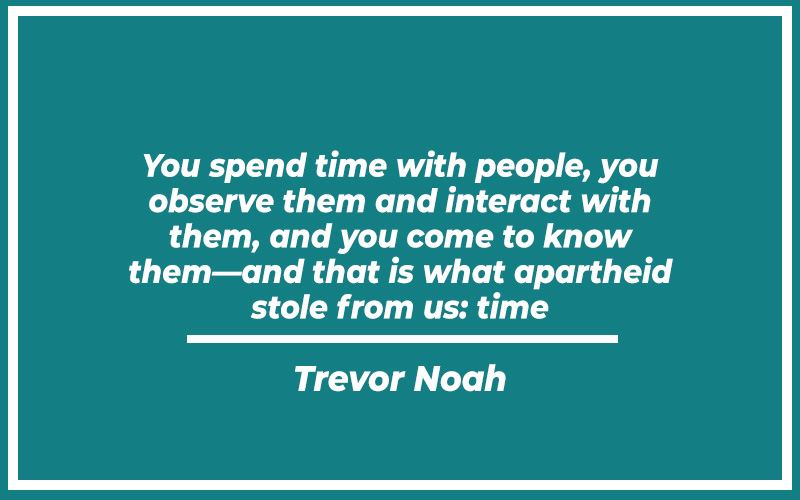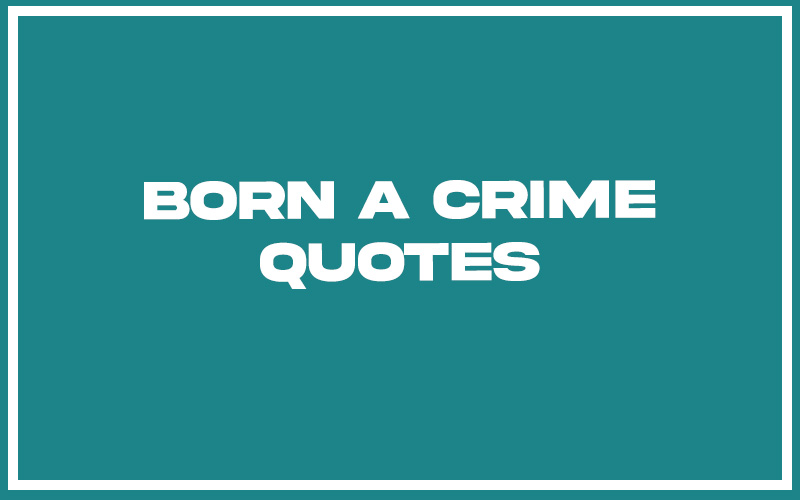If you’re someone who appreciates storytelling that mixes humor with poignant insights, then Trevor Noah’s Born a Crime will resonate with you. This memoir offers a compelling look at Noah’s childhood in apartheid South Africa, where his very existence as a mixed-race child was against the law.
Quotes from Born a Crime are not just reflections on a personal history but also on the broader social issues of racism, identity, and resilience.
As you explore these quotes, you’ll find they manage to be both deeply moving and surprisingly funny, illuminating the complexities of navigating a world that views you as an anomaly.
Best Born a Crime Quotes

“Language, even more than color, defines who you are to people.” – Trevor Noah
Trevor Noah’s insight from “Born a Crime” illustrates the profound impact of language on identity and social perception. He suggests that language can shape interactions more significantly than racial identity, highlighting its role as a powerful social tool.
This commentary emphasizes that the way individuals communicate can influence societal inclusion or exclusion, thereby impacting personal and collective identities. Noah’s observation invites reflection on the importance of language in shaping our experiences and relationships within diverse communities.
Also Read: Catwoman Quotes (with Explanation)
“In America, the dream is to make it out of the ghetto. In Soweto, because there was no leaving the ghetto, the dream was to transform the ghetto.” – Trevor Noah
This quote reflects on the differing aspirations shaped by environmental and societal constraints. Trevor Noah contrasts the American dream with the reality in Soweto, where the goal shifts from escape to transformation due to enduring socio-economic barriers.
It illustrates the resilience and adaptability of communities that face systemic obstacles, emphasizing a proactive approach to improving one’s circumstances rather than seeking escape.
“In any society built on institutionalized racism, race-mixing doesn’t merely challenge the system as unjust, it reveals the system as unsustainable and incoherent.” – Trevor Noah
Trevor Noah’s commentary on the impact of interracial relationships in a racially divided society underscores how such unions challenge and expose the flaws of institutional racism.
By forming bonds that cross racial lines, individuals directly contradict the principles upon which racist systems are built, proving them to be not only unjust but fundamentally flawed and unsustainable. This insight encourages a reevaluation of societal structures and highlights the power of personal relationships to instigate broader societal changes.
“What I do remember, what I will never forget, is the violence that followed. The triumph of democracy over apartheid is sometimes called the Bloodless Revolution. It is called that because very little white blood was spilled. Black blood ran in the streets.” – Trevor Noah
Trevor Noah challenges the narrative that labels the end of apartheid in South Africa as a “Bloodless Revolution.” By emphasizing the violent reality experienced by the black community, Noah provides a corrective to the sanitized version of history, highlighting the racial disparities even in the narrative of liberation.
This quote serves as a powerful reminder of the unequal sacrifices that underpinned the struggle for freedom and the ongoing need to acknowledge these truths in the historical record.
“The world doesn’t love you. If the police get you, the police don’t love you. When I beat you, I’m trying to save you. When they beat you, they’re trying to kill you.” – Trevor Noah
This quote from Trevor Noah’s mother encapsulates a harsh lesson imparted to young Trevor about the realities of growing up as a black child in apartheid South Africa. It distinguishes the tough love shown by a parent from the brutal treatment expected from an oppressive system.
This message underscores the protective instincts of a mother in a hostile environment and highlights the stark contrast in intentions between personal discipline and systemic abuse.
“Racism teaches us that we are different because of the color of our skin. But because racism is stupid, it’s easily tricked.” – Trevor Noah
Noah comments on the absurdity of racism, pointing out that it is based on superficial and arbitrary distinctions. His observation that racism can be “easily tricked” suggests that social constructs of race are fragile and can be undermined through simple yet profound acts of human connection and understanding.
This quote encourages a reevaluation of the bases of racial discrimination and promotes the potential for unity through shared human experiences.
“But the real world doesn’t go away. Racism exists. People are getting hurt. And just because it’s not happening to you, doesn’t mean it’s not happening.” – Trevor Noah
Noah’s words are a call to acknowledge and address the persistent reality of racism, regardless of one’s personal experience. This statement urges individuals to recognize and combat racial injustices that continue to affect others, advocating for a collective responsibility towards more equitable societal conditions.
It emphasizes the importance of empathy and active engagement in social issues to foster a more inclusive world.
“So many black families spend all of their time trying to fix the problems of the past. That is the curse of being black and poor, and it is a curse that follows you from generation to generation.” – Trevor Noah
This quote reflects on the generational challenges faced by black families, highlighting the ongoing struggle to overcome historical injustices and economic hardships.
Noah points out the cyclical nature of these challenges, which perpetuate poverty and racial disparities. His commentary sheds light on the systemic barriers that prevent many from escaping the legacy of their past, calling for societal changes to break these cycles.
“You want to live in a world where someone is good or bad. Where you either hate them or love them. But that’s not how people are.” – Trevor Noah
Noah critiques the oversimplification of human character into binary categories of good and bad, advocating for a more nuanced understanding of individuals. This perspective challenges the tendency to quickly judge and categorize people based on limited interactions or societal biases.
By acknowledging the complexity of human behavior, Noah encourages deeper reflection and understanding in our judgments and interactions with others.
“You’re taught from a young age that things are as they are; adults shape the reality of your world, but when you’re young enough, you question what they say because you still wonder. You’re born questioning.” – Trevor Noah
Noah points out the critical nature of questioning the status quo, which children often do instinctively. This quote suggests that societal norms and realities are constructed and perpetuated by adults, but the innate curiosity of children challenges these constructs.
It celebrates the questioning mind of youth as a key driver of learning and understanding, crucial for societal evolution and personal development.
“As a mixed person, you get the grief from the racists, and you’re not embraced by the black community.” – Trevor Noah
Here, Noah discusses the complex identity struggles faced by mixed-race individuals, particularly in a racially divided society like apartheid South Africa.
This quote sheds light on the dual alienation experienced from both the oppressive societal elements and within one’s community, highlighting the unique challenges of navigating a mixed-race identity in a polarized environment.
“Being chosen is the greatest gift you can give to another human being.” – Trevor Noah
Noah articulates the profound impact of selective human connection and recognition. This quote emphasizes the emotional and psychological significance of being chosen, whether in love, friendship, or professional contexts.
It underscores the value of personal affirmation and support, highlighting how such gestures can profoundly affect individuals’ self-worth and motivation.
“Everything I have ever done I’ve done from a place of love. If I don’t punish you, the world will punish you even worse.” – Trevor Noah
Reflecting on his mother’s philosophy, Noah explores the concept of tough love within the context of protective parenting. This quote illustrates the harsh realities that necessitate strict discipline as preparation for a more unforgiving world, especially in harsh socio-economic conditions.
It prompts a discussion on the balance between nurturing and preparing one’s children for the real world’s challenges.
“The first time I learned about apartheid was when I was getting beaten up for it.” – Trevor Noah
Noah’s personal anecdote about encountering apartheid through violence offers a stark illustration of how societal divisions and prejudices are often brutally imposed on the young.
This quote highlights the cruel and abrupt manner in which children in divided societies are introduced to the harsh realities of racial and cultural differences, marking a pivotal moment in their personal development and understanding of their place in the world.
“Comfort can be dangerous. Comfort provides a floor but also a ceiling.” – Trevor Noah
Trevor Noah discusses the paradox of comfort, highlighting its dual nature as both supportive and limiting. He suggests that while comfort can provide safety and stability, it also imposes boundaries that can hinder growth and achievement.
This quote serves as a reminder to challenge oneself and step outside the comfort zone to reach higher potentials, emphasizing that true progress often requires embracing discomfort.
“Education, or lack thereof, determines your level of superstition.” – Trevor Noah
Noah reflects on the impact of education in shaping beliefs and perceptions. By linking the level of education to susceptibility to superstitions, he points out that education not only broadens one’s knowledge but also fosters critical thinking that can challenge irrational beliefs.
This quote underscores the transformative power of education in liberating minds and influencing societal norms.
“The first thing I learned about having money was that it gives you choices. People don’t want to be rich. They want to be able to choose.” – Trevor Noah
This quote by Noah highlights the true value of wealth as the freedom it grants in making life choices. He challenges the conventional desire for wealth for its own sake, suggesting that what people truly seek is the autonomy and options that financial resources can provide.
This perspective shifts the focus from the accumulation of wealth to the pursuit of liberty in decision-making.
“You spend time with people, you observe them and interact with them, and you come to know them—and that is what apartheid stole from us: time.” – Trevor Noah
Noah poignantly remarks on the social and personal losses caused by apartheid, emphasizing the loss of opportunity for interracial understanding and connections.
He notes that by spending time with people from different backgrounds, one can bridge cultural and racial divides, which apartheid policies actively prevented, highlighting the deep societal scars left by such segregation.
“I was blessed with another trait I inherited from my mother, her ability to forget the pain in life.” – Trevor Noah
Reflecting on his resilience, Noah credits his mother for his ability to move past adversity, a trait that enabled both of them to endure and rise above their challenging circumstances.
This quote celebrates the strength found in letting go of past hurts, emphasizing emotional resilience as a vital component of overcoming life’s obstacles.
“Finding joy in the mundane became my form of rebellion.” – Trevor Noah
Noah describes finding happiness in everyday moments as an act of resistance against the backdrop of systemic oppression and personal hardship.
This quote illustrates how joy can be a powerful tool in defying and coping with the harsh realities of life, suggesting that finding contentment in simple pleasures can be a profound statement of personal agency and resilience.
“Love is not just a feeling; it’s an everyday action against oppression.” – Trevor Noah
Noah elevates the concept of love from a mere emotion to an active force against injustice. This quote suggests that love, expressed through daily actions, can combat societal inequalities and personal adversities.
It calls for love to be viewed as a deliberate practice that not only supports and uplifts individuals but also challenges and transforms oppressive structures.
Comfort can be dangerous. Comfort provides a floor but also a ceiling.” – Trevor Noah
Trevor Noah explores the dual nature of comfort, which can provide safety and stability but also limit growth and potential. This quote prompts a reflection on the risks of becoming too comfortable, where one may stop striving for improvement or accepting new challenges.
It’s a call to occasionally step outside comfort zones to achieve greater heights and experiences, advocating for a balance between security and growth.
“Education, or lack thereof, determines your level of superstition.” – Trevor Noah
Noah connects the level of education with susceptibility to superstitions, suggesting that education plays a critical role in shaping rational thinking and reducing irrational beliefs.
This observation underscores the importance of education in promoting critical thinking skills that can debunk myths and encourage a more scientific understanding of the world. It highlights the transformative power of education in broadening perspectives and combating misinformation.
“The first thing I learned about having money was that it gives you choices. People don’t want to be rich. They want to be able to choose.” – Trevor Noah
This quote by Noah redefines the common aspiration for wealth by highlighting that the core desire is not for money itself but for the autonomy it provides. It suggests that wealth is valued because it enables individuals to make choices freely, enhancing their quality of life and personal freedom.
This perspective shifts the focus from the pursuit of wealth as an end to seeing it as a means to achieve greater personal agency.

“You spend time with people, you observe them and interact with them, and you come to know them—and that is what apartheid stole from us: time.” – Trevor Noah
Noah reflects on the deeper social and emotional costs of apartheid, emphasizing how the segregation stole opportunities for meaningful cross-cultural interactions and understanding. By depriving individuals of the chance to spend time with one another, apartheid hindered the natural human process of building empathy and understanding through personal relationships.
This quote highlights the importance of interpersonal experiences in overcoming prejudices and building a cohesive society.
“I was blessed with another trait I inherited from my mother, her ability to forget the pain in life.” – Trevor Noah
Reflecting on his mother’s resilience, Noah appreciates the inherited ability to let go of past hardships. This trait underscores a form of emotional strength vital for moving forward and not being held back by previous suffering.
It celebrates the power of resilience and the capacity to focus on the present and future rather than being anchored by the pain of the past.
“Finding joy in the mundane became my form of rebellion.” – Trevor Noah
Noah describes finding happiness in everyday life as an act of defiance against the backdrop of systemic oppression and personal challenges. This approach suggests that joy can be a powerful form of resistance, transforming ordinary moments into opportunities for pleasure and satisfaction.
It is a testament to the human spirit’s capacity to find light in darkness, making the most of one’s circumstances regardless of external factors.
“Love is not just a feeling; it’s an everyday action against oppression.” – Trevor Noah
Here, Noah elevates the concept of love from a mere emotion to a proactive force in combating injustice. By framing love as an action, he emphasizes its potential to make significant impacts, particularly against oppressive systems.
This view encourages actively expressing love through deeds that support, uplift, and advocate for others, showcasing love as a dynamic and transformative power in society.
Also Read: Pay Attention Quotes (with Explanation)
Final Thoughts
Quotes from Born a Crime are as enlightening as they are engaging. As you reflect on Trevor Noah’s words, let them challenge you to think about the larger narratives of history and personal experience.
Remember, Noah’s story is a testament to the power of humor and perspective in overcoming adversity.
Let these quotes inspire you to look at your own challenges through a lens of resilience and to find the courage to share your truth, just as Trevor Noah has done with his.

